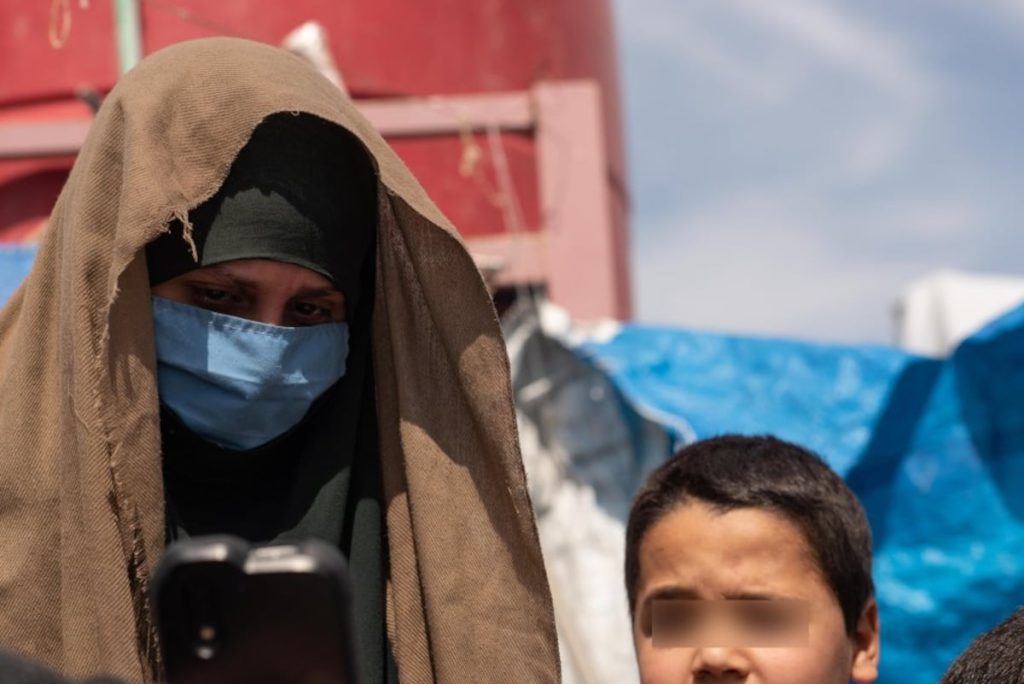The National Court Prosecutor’s Office is requesting six years in prison for Luna Fernández Grande and Yolanda Martínez Cobos, the two wives of jihadists repatriated in January 2023 from northern Syria with the 13 children they were responsible for (nine of them were their biological children). The Public Prosecutor’s Office accuses them of belonging to a terrorist organization for their alleged links to the Al Andalus Brigade, a terrorist cell based in Spain that was dismantled in 2014. According to the indictment by the Prosecutor’s Office, to which EL PAÍS has had access, Martínez supposedly played a “prominent role” in recruiting members for this cell, while Fernández “exercised leadership within the group of women” in it. In the case of the latter, the police intercepted a letter to another group member in which the woman discussed “taking action.” Both, for whom the public ministry also requests five years of supervised release once they have served their sentence, have been in pre-trial detention since they landed in Spain.
Yolanda Martínez and Luna Fernández traveled “voluntarily” to Syria between 2014 and 2015 with their husbands, Omar El Harchi and Mohamed Amin El Aabou, both members of the Al Andalus Brigade, to settle in the self-proclaimed caliphate of Abu Bakr Al-Baghdadi. They did so, as highlighted in the Prosecutor’s Office’s written statement, “sharing and accepting the same fate” as their partners. They remained there until the defeat of ISIS and its loss of control of the territory. They were then arrested and taken to a detention center in Al Hol, controlled by Kurdish militias in Syria. This newspaper located them there in 2019 and published a video interview with them in which they appealed to the Spanish authorities to get them out of there and bring them back to Spain. The government of Pedro Sánchez then initiated, despite the reluctance of counterterrorism experts, the necessary procedures for repatriation, which materialized early last year. The two alleged jihadists landed at the military base of Torrejón de Ardoz (Madrid) along with the 13 children, and immediately entered prison by order of National Court Judge Santiago Pedraz.
In the indictment requesting six years in prison for them, the Prosecutor’s Office cites those statements they made to EL PAÍS as evidence of their “full adherence” to jihadist principles and, therefore, their alleged affiliation with the terrorist organization. In the video, Martínez explained that the organization provided them with a house and a job for her husband at the ISIS courts, thanks to which they achieved “economic stability.” The Prosecutor’s Office points out that only members of the Islamic State were granted these privileges. For her part, Fernández stated in the same interview: “Just as many countries make their laws, Allah has made a law and he knows, we do not know…”. According to the public ministry’s written statement, these words reflect the “internalization of a radical and extremist view of Islam, where sharia law prevails over the legislation of countries.”
The investigation establishes that none of these women’s children ever attended school while in Syria, and that the older children of both were indoctrinated under ISIS teachings. This was declared by the children themselves, who stated that their mothers taught them at home “their vision of Islamic practice and values.” The indictment includes a police report in the case highlighting that the Islamic State required children between 6 and 18 years old and girls between 6 and 15 years old to attend their schools, where “the only subject was religion.” Once this indoctrination was completed, the document emphasizes that boys “could perform various functions: spies, recruiters, soldiers, executors, or suicide bombers,” for which they also received “early physical training.” Girls were prepared “for domestic tasks from a young age, such as cooking and caring for children.” In this regard, the Prosecutor’s Office highlights that “their role is not to educate a child, as any parent would do anywhere in the world, but to do so following the guidelines of ISIS, integrating into the organization and assuming the role reserved for them. (…) The role of wife and mother is crucial” for the terrorist group and its survival, adds the public ministry.
The Prosecutor’s Office concludes that the two accused “always showed their willingness to be members” of ISIS, and “only the complete loss of territorial control after the fall of the Syrian city of Baguz, the last stronghold where they were voluntarily until the end, as well as the living conditions in the reception camp, were the reasons why both requested to be repatriated to Spain.” According to these provisional conclusions, this case demonstrates the “deliberate strategy” of ISIS to recruit the female population, something that “constitutes an unprecedented phenomenon in the dynamics of other jihadist groups.” According to a study by the Real Instituto Elcano, between 2001 and 2011, there were no women detained in Spain for jihadist activities. Currently, they represent around 12% of arrests, mostly dedicated to providing logistical support, recruiting other women, or financing the organization.















